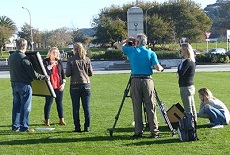NZSL e-learning resource project hits milestone

The DSRU has funding from the New Zealand Sign Language Fund and the TAB Book Project Committee for its LearnNZSL project which will help New Zealanders learn NZSL online.
School of Linguistics and Applied Language Studies Lecturer Sara Pivac Alexander says the project involves developing a free online suite of NZSL exercises for second language NZSL learners. The resource will feature four characters and their everyday lives, and include up to 500 videos in NZSL, supported by learning tasks.
Sara says that the 2013 report, A New Era in the Right to Sign states that for a language to live it must also be available to the broader population in order to build an appreciation and knowledge of the language.”
“We have a pool of NZSL tutors in this country but not all areas offer NZSL classes, which means many New Zealanders have limited opportunities to learn NZSL.” She says they receive regular requests about NZSL online courses.
“This new e-learning resource aims to address these gaps and motivate more New Zealanders to learn about our language from the comfort of their homes. More New Zealanders knowing NZSL means Deaf people have more opportunities to communicate in NZSL and thus, better participate in education, family and community activities.”
Sara says students will be able to use the resource independently to learn NZSL on their own, anytime, anywhere in New Zealand or to support in-class learning.
“Content will be drawn from the TeachSign (NZSL Level 1 Community Education) curriculum with nine topics focusing on everyday communication. Each topic will be presented in four sections: Words, Phrases, Conversations and Wrap Up.”
Award-winning e-learning company Kineo are building the website with filming by Video NZ, who also worked on the NZSL Online Dictionary.
Sara expects that the e-learning resource will be tested with learners late this year for a launch early in 2017.
Story based on an original article on the Office for Disability Issues website.
